- Home
- Elizabeth George
Careless in Red Page 3
Careless in Red Read online
Page 3
He was jouncing along the unpaved lane behind Victoria Road and wiping the rain from his face when his father drove past him on the way to the house. Lew Angarrack didn’t look at his son, although his expression of distaste told Cadan his father had clocked the sight he presented, not to mention been given a reminder of why his progeny was on a bicycle in the rain and no longer behind the wheel of his car.
Up ahead of him, Cadan saw his father get out of the RAV4 and open the garage door. He reversed the Toyota into the garage, and by the time Cadan wheeled his bicycle through the gate and into the back garden, Lew had already hosed off his surfboard. He was heaving his wet suit out of the four-by-four to wash it off as well, while the hosepipe burbled freshwater onto the patch of lawn.
Cadan watched him for a moment. He knew that he looked like his father, but their similarities ended with the physical. They had the same stocky bodies, with broad chests and shoulders, so they were built like wedges, and the same surfeit of dark hair, although his father was growing more and more of it over his body, so that he was starting to look like what Cadan’s sister privately called him, which was Gorilla Man. But that was it. As to the rest, they were chalk and cheese. His father’s idea of a good time was making sure everything was permanently in its place with nothing changing one iota till the end of his days, while Cadan’s was…well, decidedly different. His father’s world was Casvelyn start to finish and if he ever made it to the north shore of Oahu—big dream, Dad, and you just keep dreaming—that would be the world’s biggest all-time miracle. Cadan, on the other hand, had miles to go before he slept and the end of those miles was going to be his name in lights, the X Games, gold medals, and his grinning mug on the cover of Ride BMX.
He said to his father, “Onshore wind today. Why’d you head out?”
Lew didn’t reply. He streamed the water over his wetsuit, flipped it, and did the same to the other side. He washed out the boots, the hood, and the gloves before he looked at Cadan and then at the Mexican parrot on his shoulder.
He said, “Best get that bird out of the rain.”
Cadan said, “It won’t hurt him. It rains where he comes from. You didn’t get any waves, did you? Tide’s just now coming in. Where’d you go?”
“Didn’t need waves.” His father scooped the wet suit from the lawn and hung it where he always hung it: over an aluminium lawn chair whose webbed seat caved in with the ghost weight of a thousand bums. “I wanted to think. Don’t need waves for thinking, do I?”
Then why go to the trouble of getting the kit ready and hauling it down to the sea? Cadan wanted to ask. But he didn’t because if he asked the question, he’d get an answer and the answer would be what his father had been thinking of. There were three possibilities, but since one of them was Cadan himself and his list of transgressions, he decided to forego further conversation in this area. Instead, he followed his father into the house, where Lew dried his hair off with a limp towel left hanging for this purpose on the back of the door. Then he went to the kettle and switched it on. He’d have instant coffee, one sugar, no milk. He’d drink it in a mug that said “Newquay Invitational” on it. He’d stand at the window and look at the back garden and when he’d finished the coffee, he’d wash the mug. Mr. Spontaneity himself.
Cadan waited till Lew had the coffee in hand and was at the window as usual. He used the time to establish Pooh in the sitting room at his regular perch. He returned to the kitchen himself to say, “Got a job, then, Dad.”
His father drank. He made no sound. No slurp of hot liquid and no grunt of acknowledgement. When he finally spoke, it was to say, “Where’s your sister, Cade?”
Cadan refused to allow the question to deflate him. He said, “Did you hear what I told you? I’ve got a job. A decent one.”
“And did you hear what I asked you? Where’s Madlyn?”
“As it’s a workday for her, I expect she’s at work.”
“I stopped there. She’s not.”
“Then I don’t know where she is. Moping into her soup somewhere. Crying into her porridge. Whatever she might be doing instead of pulling herself together like anyone else would. You’d think the bloody world has ended.”
“Is she in her room?”
“I told you—”
“Where?” Lew still hadn’t turned from the window, which was maddening to Cadan. It made him want to down six pints of lager right in front of the man, just to get his attention.
“I said I didn’t know where—”
“Where’s the job?” Lew pivoted, not just a turn of his head but of his whole body. He leaned against the windowsill. He watched his son, and Cadan knew he was being read, evaluated, and found wanting. It was an expression on his father’s face he’d been looking at since he was six years old.
“Adventures Unlimited,” he said. “I’m to do maintenance on the hotel till the season starts.”
“What happens then?”
“If things work out, I’ll do instruction.” This last bit was a stretch, but anything was possible, and they were in the process of interviewing instructors for the summer, weren’t they? Abseiling, cliff climbing, sea kayaking, swimming, sailing…He could do all of that, and even if they didn’t want him in those activities, there was always freestyle BMX and his plans for altering the crazy golf course. He didn’t mention this to his father, though. One word about the freestyle bicycle and Lew would read Ulterior Motives as if the words were tattooed on Cadan’s forehead.
“‘If things work out.’” Lew blew a short breath through his nose, his version of a derisive snort, which said more than a dramatic monologue would have and all of it based upon the same subject. “How’re you intending to get there, then? On that thing outside?” By which he meant the bike. “Because you won’t be getting your car keys back from me, nor your driving licence. So don’t start thinking a job’ll make a difference.”
“I’m not asking for my keys back, am I?” Cadan said. “I’m not asking for my licence. I’ll walk. Or I’ll ride the bike if I have to. I don’t care what I look like. I rode it there today, didn’t I?”
That breath again. Cadan wished his father would just say what he was thinking instead of always telegraphing it through facial expressions and not-so-subtle sounds. If Lew Angarrack just came out and declared, You’re a loser, lad, Cadan would at least have something to row with him about: failures as son set against a different sort of failures as father. But Lew always took the indirect route, and this was one that generally used the vehicle of silence, heavy breathing, and—in a pinch—outright comparisons of Cadan and his sister. She was the sainted Madlyn, of course, a world-class surfer, headed for the top. Until recently, that is.
Cadan felt bad for his sister and what had happened to her, but a small, nasty part of him crowed in joy. For such a small girl, she’d been casting a large shadow for far too many years. He said, “So that’s it, then? No, ‘Good job of it, Cade,’ or ‘Congratulations,’ or even ‘Well, you’ve surprised me for once.’ I find a job—and it’s going to pay good money, by the way—but that’s sod all to you because…what? It’s not good enough? It’s got nothing to do with surfing? It’s—”
“You had a job, Cade. You cocked it up.” Lew downed the rest of his coffee and took his mug to the sink. There, he scoured it out as he scoured out everything. No stains, no germs.
“That’s bollocks,” Cadan said. “Working for you was always a bad idea, and we both know that, even if you won’t admit it. I’m not a detail person. I never was. I don’t have the…I don’t know…the patience or whatever.”
Lew dried the mug and the spoon. He put them both away. He wiped down the scratched, old stainless-steel work top, although there wasn’t a crumb upon it. “Your trouble is, you want everything to be fun. But life’s not that way, and you don’t want to see it.”
Cadan gestured outside, towards the back garden and the surfing kit that his father had just rinsed off. “And that’s not fun? You’ve spent all your free time f
or your entire life riding waves, but I’m supposed to see that as…what? Some noble endeavour like curing AIDS? Putting an end to world poverty? You give me aggro about doing what I want to do, but haven’t you done the very same? But wait. Don’t answer. I already know. What you do’s all about grooming a champion. Having a goal. While what I do—”
“There’s nothing wrong with having a goal.”
“Right. Yes. And I have mine. It’s just not the same as yours. Or Madlyn’s. Or what Madlyn’s was.”
“Where is she?” Lew asked.
“I told you—”
“I know what you told me. But you must have some idea where your own sister might have taken herself off to if she didn’t go to work. You know her. And him. You know him as well, if it comes down to it.”
“Hey. Don’t put that on me. She knew his reputation. Everyone knows it. But she wasn’t having any words of wisdom from anyone. And anyway, what you really care about is not where she is at this exact moment but that she got derailed. Just like you.”
“She isn’t derailed.”
“She bloody well is. And where does that leave you, Dad? You pinned your dreams on her instead of living your own.”
“She’ll get back to it.”
“Don’t put money on that.”
“And don’t you—” Abruptly, Lew bit off whatever it was he’d intended to say.
They faced each other then across the width of kitchen. It was an expanse of less than ten feet, but it was also a chasm that grew wider every year. Each of them stood at his respective edge, and it seemed to Cadan that the time would come when one of them was going to topple over the side.
SELEVAN PENRULE TOOK HIS time about getting over to Clean Barrel Surf Shop, having quickly decided it would be unseemly to bolt out of the Salthouse Inn the moment the whisper went round about Santo Kerne. He certainly had reason to bolt, but he knew it wouldn’t look good. Beyond that, at his age he was beyond bolting anywhere. Too many years of milking cows, not to mention herding the bloody bovines in and out of pastures, and his back was permanently bent and his hips were done for. Sixty-eight years old, he felt like eighty. He should have sold out and opened up the caravan park thirty-five years earlier, and he would have done so had he only had the cash, the bollocks, the vision, no wife, and no kids. They were all gone now, the house was torn down, and the farm was converted. Sea Dreams, he’d called it. Four neat rows of holiday caravans like shoe boxes, perched on the cliffs above the sea.
In his car, he was careful. There were dogs occasionally on the country lanes. Cats too. Rabbits. Birds. Selevan hated the thought of hitting something, not so much because of the guilt or responsibility he might feel having brought about a death but because of the inconvenience it would cause him. He’d have to stop and he hated to stop once he set out on a course of action. In this case, the course of action was getting himself over to Casvelyn and into the surf shop where his granddaughter worked. He wanted Tammy to hear the news from him.
When he reached the town, he parked on the wharf, the nose of his antique Land Rover pointing towards the Casvelyn Canal, a narrow cut that had once connected Holsworthy and Launceston with the sea but that now meandered inland for seven miles before ending abruptly, like an interrupted thought. This put him across the River Cas from the centre of town where the surf shop was, but finding a spot for the car was always too much trouble over there—no matter the weather or the time of year—and, anyway, he wanted the walk. Tracing a path back along the crescent of road that defined the southwest edge of the town, he would have time to think. He had to have an approach that would play the information out and allow him to gauge her reaction to it. For what Tammy said she was and who Tammy really was were, as far as Selevan Penrule was concerned, in outright contradiction to each other. She just didn’t know that yet.
Out of the car, he gave a nod to several fishermen who stood smoking in the rain, their craft at rest against the side of the wharf. They’d have come up from the sea by way of the canal lock at the wharf ’s far end, and they presented a stark contrast to the boats and boatmen who would be in Casveyln with the start of summer. Selevan vastly preferred this group to those who would arrive with the better weather. True, he made his money from the tourist trade, but he didn’t have to like that fact.
He set off into the heart of town, going towards it along a string of shops. He stopped for a takeaway coffee at Jill’s Juices and then again for a packet of Dunhills and a roll of breath mints at Pukkas Pizza Slices Et Cetera (the accent being on the et cetera, for their pizza was rubbish in a shoe), which was where the Crescent made its turn up into the Strand. Here the road created a slow climb to the top of the town, and Clean Barrel Surf Shop stood on a corner half the distance up, just along a route that offered a hair salon, a decrepit nightclub, two extremely down-at-heel hotels, and a fish-and-chips takeaway.
He finished his coffee before he got to the surf shop. There was no bin nearby, so he folded the takeaway cup and put it in the pocket of his rain jacket. Ahead of him, he could see a young man with Julius Caesar hair having an earnest conversation with Nigel Coyle, Clean Barrel’s owner. This would be Will Mendick, Selevan thought. He’d had high hopes of Will, but so far they’d come to nothing.
Selevan heard Will saying to Nigel Coyle, “I admit I was wrong, Mr. Coyle. I shouldn’t even have suggested it. But it’s not like it’s something I ever did before,” to which Coyle replied, “You’re not a very good liar, are you,” before walking off with his car keys jingling in his hand.
Will said darkly, “Sod you, man. Sod you for a lark,” and as Selevan came up to him, “Hullo, Mr. Penrule. Tammy’s inside.”
Selevan found his granddaughter restocking a rack with colourful brochures. He observed her the way he always observed her, like a species of mammal he’d never come upon before. Most of what he saw he disapproved of. She was skin and bones in black: black shoes, black tights, black skirt, black jersey. Hair too thin and cut too short and not even a bit of that sticky goo in it to make it do something other than what it did, which was lie lifelessly against her skull.
Selevan could have coped with the black and the skin and bones of the girl if she’d given the slightest bit of evidence that she might be normal. Ring her eyes with kohl and plant silver rings through her eyebrows and her lips and a stud in her tongue, and he understood that. Mind, he didn’t like it, but he understood. That was the fashion among certain people her age and they’d come to their senses, one hoped, before they disfigured themselves entirely. When they hit twenty-one or maybe twenty-five and they discovered that gainful employment wasn’t beating a path to their doorsteps, they’d sort themselves out. Like Tammy’s father. And what was he now? Lieutenant colonel in the army with a posting in Rhodesia or wherever, because Selevan could never keep track of him—and it would always be Rhodesia to Selevan, never mind what it wanted to call itself—and a distinguished career stretching out before him.
But as for Tammy? Can we send her to you, Dad? her father had asked Selevan, his voice coming over the phone line as true as if he’d been standing in the very next room and not in an African hotel where he’d parked his daughter prior to flying her off to England. And what was her granddad to do, then? She had her ticket. She was on her way. We can send her to you, can’t we, Dad? This isn’t the right environment for her. She sees too much. We think that’s the problem.
Selevan himself had his own ideas of what the problem was, but he liked the thought of a son relying on his father’s wisdom. Send her, Selevan told David. But mind, I’ll not have any of her nonsense if she’s going to stop with me. She’ll eat her meals and clean up after herself and—
That, his son told him, would not be a problem.
True enough. The girl barely left a wake behind her. If Selevan had thought she would cause him trouble, what he’d come to learn was that the trouble she caused came from not causing trouble at all. That wasn’t normal, which was the heart of the matter. For damn it all, s
he was his granddaughter. And that meant she was meant to be normal.
She tapped the final brochure into place and straightened the rack. She stepped back, as if to see its effect, just as Will Mendick came into the shop. He said to Tammy, “No bloody good. Coyle won’t take me back,” and then to Selevan, “You’re early today, Mr. Penrule.”
Tammy swung round from the brochure rack at this. She said, “Grandie. Didn’t you get my message?”
“Haven’t been home,” Selevan told her.
“Oh. I was…Will and I were meaning to have a coffee after closing.”
“Were you now?” Selevan was pleased. Perhaps, he thought, he’d been incorrect in his assessment of Tammy’s regard for the younger man.
“He was going to drive me home afterwards.” Then she frowned as she seemed to realise it was too early for her grandfather to be there to fetch her home anyway. She looked at a watch that flopped round on her thin wrist.
“Come from the Salthouse Inn,” Selevan said. “Been an accident out round Polcare Cove.”
“Are you all right?” she asked. “Did you get in a smash with the car or something?” She sounded concerned, and this gratified Selevan. Tammy loved her old granddad. He might be short with her, but she never held it against him.
“Not me,” he said, and here he began to watch her closely. “It was Santo Kerne.”
“Santo? What’s happened to him?”
Was there a rise to her voice? Panic? A warding off of bad news? Selevan wanted to think so, but he couldn’t reconcile the tone of her voice with the look that she exchanged with Will Mendick.
“Fell off the cliff, way I understand it,” he said. “Down Polcare Cove. Dr. Trahair brought some coast walker to the inn to phone the police. This bloke—the walker—he found the boy.”

 Well-Schooled in Murder
Well-Schooled in Murder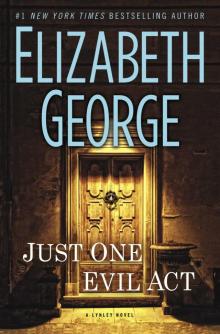 Just One Evil Act
Just One Evil Act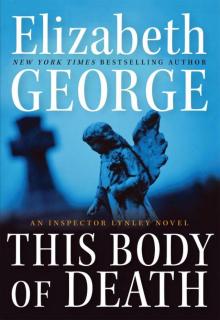 This Body of Death
This Body of Death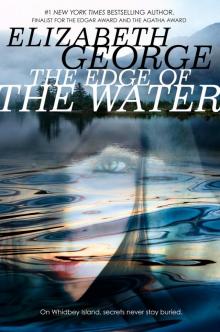 The Edge of the Water
The Edge of the Water For the Sake of Elena
For the Sake of Elena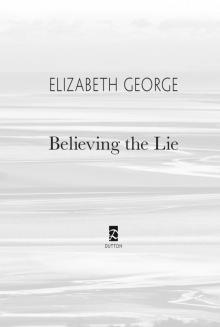 Believing the Lie
Believing the Lie The Edge of the Shadows
The Edge of the Shadows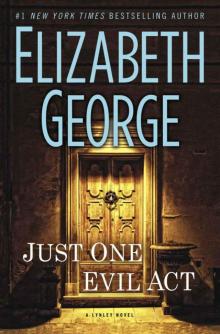 Just One Evil Act: A Lynley Novel
Just One Evil Act: A Lynley Novel In Pursuit of the Proper Sinner
In Pursuit of the Proper Sinner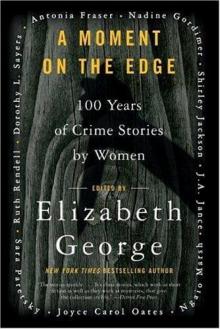 A Moment on the Edge:100 Years of Crime Stories by women
A Moment on the Edge:100 Years of Crime Stories by women Elizabeth I
Elizabeth I I, Richard
I, Richard A Traitor to Memory
A Traitor to Memory Missing Joseph
Missing Joseph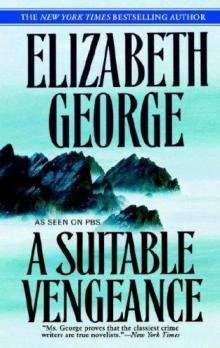 A Suitable Vengeance
A Suitable Vengeance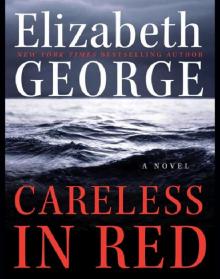 Careless in Red
Careless in Red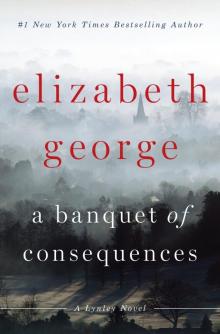 A Banquet of Consequences
A Banquet of Consequences Playing for the Ashes
Playing for the Ashes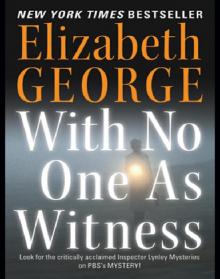 With No One As Witness
With No One As Witness Deception on His Mind
Deception on His Mind The Best American Mystery Stories 2016
The Best American Mystery Stories 2016 A Great Deliverance
A Great Deliverance In the Presence of the Enemy
In the Presence of the Enemy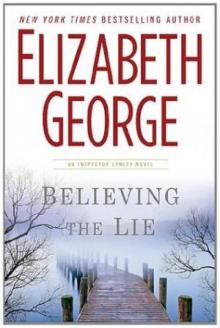 Believing the Lie il-17
Believing the Lie il-17 The Edge of the Light
The Edge of the Light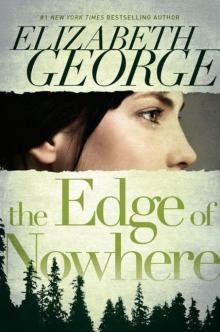 SW01 - The Edge of Nowhere
SW01 - The Edge of Nowhere A Place of Hiding
A Place of Hiding What Came Before He Shot Her il-14
What Came Before He Shot Her il-14 Payment In Blood
Payment In Blood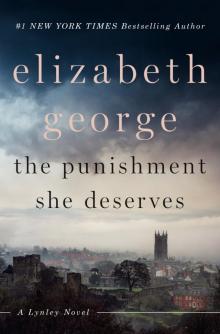 The Punishment She Deserves
The Punishment She Deserves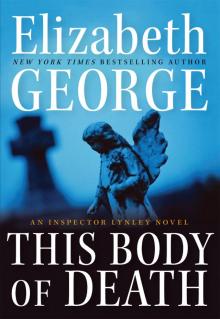 This Body of Death: An Inspector Lynley Novel
This Body of Death: An Inspector Lynley Novel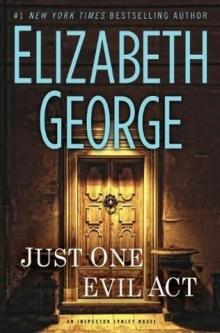 Just One Evil Act il-18
Just One Evil Act il-18 What Came Before He Shot Her
What Came Before He Shot Her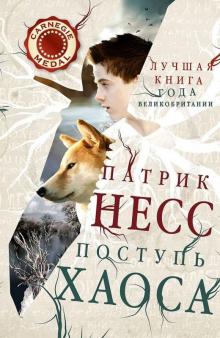 Missing Joseph il-6
Missing Joseph il-6